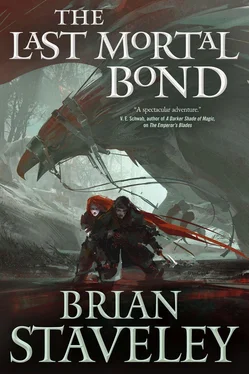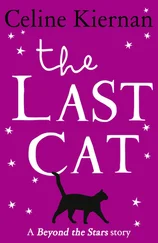Brian Staveley - The Last Mortal Bond
Здесь есть возможность читать онлайн «Brian Staveley - The Last Mortal Bond» весь текст электронной книги совершенно бесплатно (целиком полную версию без сокращений). В некоторых случаях можно слушать аудио, скачать через торрент в формате fb2 и присутствует краткое содержание. Год выпуска: 0101, ISBN: 0101, Издательство: Tom Doherty Associates, Жанр: Фэнтези, на английском языке. Описание произведения, (предисловие) а так же отзывы посетителей доступны на портале библиотеки ЛибКат.
- Название:The Last Mortal Bond
- Автор:
- Издательство:Tom Doherty Associates
- Жанр:
- Год:0101
- ISBN:9781466828452
- Рейтинг книги:5 / 5. Голосов: 1
-
Избранное:Добавить в избранное
- Отзывы:
-
Ваша оценка:
- 100
- 1
- 2
- 3
- 4
- 5
The Last Mortal Bond: краткое содержание, описание и аннотация
Предлагаем к чтению аннотацию, описание, краткое содержание или предисловие (зависит от того, что написал сам автор книги «The Last Mortal Bond»). Если вы не нашли необходимую информацию о книге — напишите в комментариях, мы постараемся отыскать её.
The Last Mortal Bond — читать онлайн бесплатно полную книгу (весь текст) целиком
Ниже представлен текст книги, разбитый по страницам. Система сохранения места последней прочитанной страницы, позволяет с удобством читать онлайн бесплатно книгу «The Last Mortal Bond», без необходимости каждый раз заново искать на чём Вы остановились. Поставьте закладку, и сможете в любой момент перейти на страницу, на которой закончили чтение.
Интервал:
Закладка:
He will be the last, Adare decided. She gazed the length of the valley, the final resting place of so many Malkeenians. It was his, anyway, this empire we called Annur. He made it, and he is dead.
She raised her chin.
The sun was cold on her face.
When she spoke, her words sounded like something written down long ago, as though she were listening to herself from some inexplicable distance.
“What remains is the oldest work, the only labor, that endless task from which the dead have been absolved at last: to go into this smoldering, splintered world, and to make from the wreckage something strange and new, something unknown to us until now.”
EPILOGUE
A woman with eyes that burn like fire walks to the center of a bridge over deep, fast water. The woman has a name, as does the river, as does the bridge-Adare hui’Malkeenian, the White River, the Span of Peace-but the name is not the thing. This is the first of many challenges facing the Historian.
All record is translation. There is no way to press that woman between the pages of a codex, no way to preserve the scarred man who approaches her but in words. All approaches are imperfect:
Valyn hui’Malkeenian, the first son of Sanlitun hui’Malkeenian, first of that name …
A badly scarred young man, his dark flesh twisted with muscle, stalking across the span …
Chosen by Hull in the caverns beneath Irsk, a warrior-prophet faster and stronger than all other men …
The Kettral commander who defected from Annur to join the Urghul north of the White River …
Murderer of hundreds, traitor to his own people …
Loyal brother …
Beast …
The characters shift with the focus, like the clouds scraping across the bowl of the sky, like the never-still shapes of the river surging between the piers below. Like waves, men and women exist only in motion, in change. Put them on the page, and you have already failed.
And then there are their words:
“This bridge,” says the Emperor, the sister, the mother, the prophet, gesturing to the stones beneath her feet, “this edifice, is a monument to the newfound peace between Annurians and Urghul.”
This is a lie. The bridge will be different things to different people over the long years. To Adare, now, it is the price she has paid to make the Urghul stay out of Annur. Her brother does something like a smile with his face. How to describe it?
“A link,” he agrees, “between two great lands.”
This, too, a lie. To Valyn, the bridge is the knife he holds against his sister’s throat. He is not the chieftain of the Urghul; they fractured into a hundred rival tribes when the Kettral killed the leach who led them, their assault on the city suddenly inchoate, hopeless. He is not their chieftain, but as the only Annurian who rides among them, he speaks here for all the pale riders. He translates their Urghul words into Annurian, then translates the plain truth once more into this lie he sets before his sister.
“It will bring us closer.”
The bridge was his idea. The paved span took half a year to build. It is wide enough for twenty Urghul to ride abreast, which they will do, if the Emperor closes her fist too tightly around her empire. If it is even still an empire.
The word that the historian might use for the bridge is bond -the bridge binds as surely as any chain-but it is not a historian’s place to use his own words. When he pens this moment, he will record the words as they were spoken: Monument to peace. A link between lands.
What else will he record? The detail is infinite. A full description of the scene, of each of the tens of thousands of horses gathered on the northern bank, of every ranked legionary at the Emperor’s back, would be impossible. There is a universe of truth in the green-gold dragonfly that buzzes between these two Malkeenians, in the patterns of its fine-veined wings, in the refractions of its multiform eyes. A diligent historian could reflect for a lifetime on a single, swaying nuns-blossom, on the tessellation of the flower’s white petals.…
For millennia, this was the way of the Csestriim: accounts of glaciation, records of water levels in flood and drought, examinations of the courses of the stars, investigations into heredity, numerical pattern, river formation, each with its columns and tallies, charts, maps, graphs.
They had no stories-irrational to labor in the creation of the unreal. Their histories, before the humans came, were lists of dates, of deeds. Even after, the Historian cleaved to this approach, cleaved to it until it failed him.
The brother and sister have locked eyes: his black, scarred; hers on fire. The thousands watching from either bank will try to read the future in this moment, but they will fail. The Historian has been at his task long enough to understand that the future is beyond him. Even this present is unreachable. There is too much of it, even for him. It is too bright; there are too many layers. The past, the present, the future-it is all beyond his grasp, the translation of a translation of a translation. Even the spoken words as they reach his ears are late, caught in the air’s clear amber.
If the work cannot be done, what will he do?
The Historian smiles. It took him centuries to learn to smile.
The world is the world; his history is something else. What will he do? He will make the story up.
Интервал:
Закладка:
Похожие книги на «The Last Mortal Bond»
Представляем Вашему вниманию похожие книги на «The Last Mortal Bond» списком для выбора. Мы отобрали схожую по названию и смыслу литературу в надежде предоставить читателям больше вариантов отыскать новые, интересные, ещё непрочитанные произведения.
Обсуждение, отзывы о книге «The Last Mortal Bond» и просто собственные мнения читателей. Оставьте ваши комментарии, напишите, что Вы думаете о произведении, его смысле или главных героях. Укажите что конкретно понравилось, а что нет, и почему Вы так считаете.












